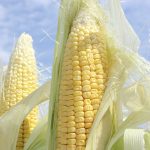 Here’s a likely culprit to your weight gain.
Here’s a likely culprit to your weight gain.
Yes, corn may be actually be making you fat. Regardless of how little or how much you eat of the fresh grown version, you’re probably overdosing on the suspected bad version.
When corn is refined into high fructose corn syrup (HFCS) it becomes a combination of glucose and fructose. Your everyday table sugar (sucrose) is a 50-50 mixture of glucose and fructose. HFCS can range from 42%, 55% or 90% fructose to glucose ratios depending on its final use.
There’s a lot of controversy as to the implications of using HFCS in the processed food and beverage industry and the resulting rise in obesity. Studies so far have not provided a conclusive relationship. There are also other factors such as decreased physical activity, emotional triggers and excito-toxins (chemical flavor enhancers which stimulated increased consumption) contributing to weight gain and obesity.
However, a recent small study by Dr. Robert Sherwin, a Yale University endocrinologist, increases suspicions of the role of HFCS in weight gain. Twenty normal weight test subjects were given two MRI brain scans weeks apart. In the study one group received a glucose drink and the other a HFCS drink.
Those who drank the glucose sample reported feeling more full. This was corroborated with their brain scans which indicated according to Dr. Sherwin that glucose “turns off or suppresses the activity of areas of the brain that are critical for reward and desire for food… .” By contrast, brain scans indicated that HFCS did not turn off or suppress the same brain activity. Consequently, it appears that the desire to eat continues with HFCS.
These results are intriguing and further studies are planned to verify if the same results are found in those with obesity.
In the mean time, if you feel the food you’re indulging in isn’t satisfying you, the culprit might just be that HFCS sweetening ingredient. It seems that despite your best efforts, your brain could be tricked into eating more by this secret saboteur.
What do you think? Do you know how much HFCS you’re eating?
Source:
http://www.huffingtonpost.com/2013/01/02/fructose-overeating-obesity-brain-imaging-_n_2395413.html?utm_hp_ref=food&ir=Food
Wikipedia: High Fructose Corn Syrup
You Can Find Me At -


There are no good reports about the benefits of HFCS except perhaps how it is fattening up the bank accounts of the companies that are putting it into almost all processed foods. Sugar is addicting and this is Sugar. The sad news is that people really need to work to avoid HFCS if they use processed foods. It is in Everything. When people start to understand that these “Friendly Food Companies” are killing us, maybe they will return to eating fresh foods that don’t contain HFCS or GMO’s. This is a great article that should be shared with men and women alike. Thanks.
You’re so right. The whole idea of creating HFC was to produce a cheaper sugar source.
Thank you for writing this, Joyce – people need to know just how bad corn and HFCS really is for our bodies! I’m also allergic to corn, so it’s doubly bad for me. Corn is really not good for people!!
Barbara,
There’s no question HFCS is bad, but it’s cheap and serves the food and beverage
industry who unfortunately don’t see it as a problem let alone the GMO implications.
It seems your allergy is serving you well.